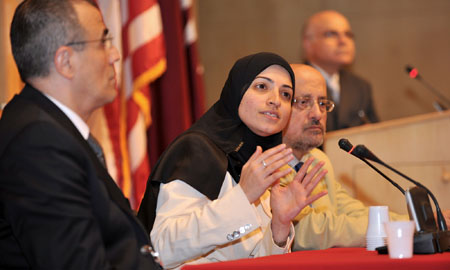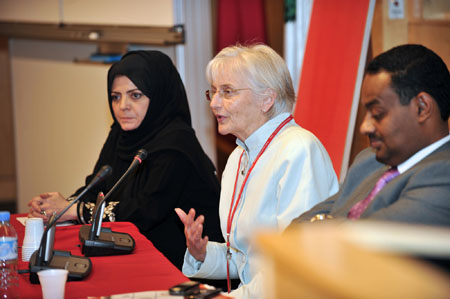Mental Health Issues in Qatar Topic of Seminar on World Mental Health Day
October 10, 2010

Dr. Suhaila Ghuloum, center, answers a questions during a seminar at
WCMC-Q for World Mental Health Day. Seated with her, left to right,
are Dr. Hassen Al-Amin and Dr. Mamoun Mobayed. Dr. Ziad Kronfol,
far right, serves as moderator.
About a third of adult patients at primary health care centers in Qatar have some form of mental illness; and outpatient visits to Hamad Hospital’s psychiatry unit have increased considerably in recent years.
Meanwhile nearly half the population of Qatar believes mental illness could be a punishment from God and only one-third believes mentally ill patients can work in regular jobs.
Mental health issues such as these and the country’s resources for addressing them were among the topics discussed at a seminar at Weill Cornell Medical College in Qatar Sunday as health care organizations launched a week-long awareness campaign in recognition of World Mental Health Day.
The prevalence of mental disorders in Qatar and the lack of understanding around mental illness were discussed by Dr. Suhaila Ghuloum, head of the psychiatry department at Hamad Medical Corporation, who has done research on the topic. “These attitudes raise concerns about the integration of patients with mental illness into the community,” says Dr. Ghuloum. “It also highlights the need for more awareness about mental illness in the country,” she says.
Treatments for mental illness have improved greatly in recent years, according to Dr. Mamoun Mobayed, consultant psychiatrist and director for the Study and Research Department at the Social Rehabilitation Center in Doha. “Progress in treatment is guided by our growing body of constantly evolving knowledge,” says Dr. Mobayed.

Other presenters at the seminar are, left to right, Mrs. Hadia Baker
Abulaban of the Family Consulting Center, Dr. Joan Lanning of WCMC-Q,
and Dr. Nadir Elzain Omara of Al-Ahli Hospital.
Culture is a key issue in our understanding of mental health and illness, according to Dr. Hassen Al-Amin, associate professor of psychiatry at Weill Cornell Medical College and consultant psychiatrist at Hamad Medical Corporation. “People from different cultures have different ways of expressing themselves,” says Dr. Al-Amin. “For example, there is no word for depression in Arabic dialects or street language. Instead, people may say their head is hurting. Without understanding the culture and how people express themselves, the language may obscure diagnosis and complicate treatment.” Family counselor Hadia Baker Abulaban discussed the effect of marital conflicts on children.
"Warm responsive care supports brain development in children, particularly the pathways determining emotion and social responsiveness in adulthood," Mrs. Abulaban says. On the other hand, stressful or traumatic experiences undermine development and lower the threshold for activation of the stress response in later life. “It’s important to remember that it is not a problem to have a problem,” says she. “Conflict handled well can be productive, leading to deeper understanding, mutual respect and closeness.”
The concept of shame as both a positive force for controlling behavior and a negative force for manipulating rules was discussed by Joan Lanning, Ph.D., director of the Employee Assistance Program at Weill Cornell Medical College in Qatar. “There is a difference between guilt and shame,” says Dr. Lanning. “Guilt is an emotion that results from behaving in a manner contrary to our beliefs and values, while shame is a response to a personal failure relative to others’ expectations. Guilt encourages us to live within personal, family and cultural rules, while shame encourages us to manipulate those rules to make us feel good about ourselves.”
Sex, drugs, and lies as mental disorders were discussed by Dr. Nadir Elzain Omara, consultant psychiatrist at Al-Ahli Hospital in Doha. “Because psychosexual disorders, substance abuse, eating and personality disorders share some common origins, the principles of their management are almost identical,” says Dr. Omara. “But more importantly, they are viewed as a perversion of normal behavior, which can lead to prejudicial attitudes against individuals with any of these disorders, “he says. “Disapproving attitudes obscure our understanding of these disorders and may discourage people from seeking help.”
By Kristina Goonough
Read this release in Arabic
